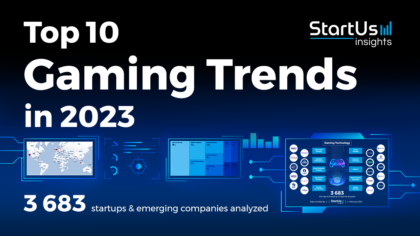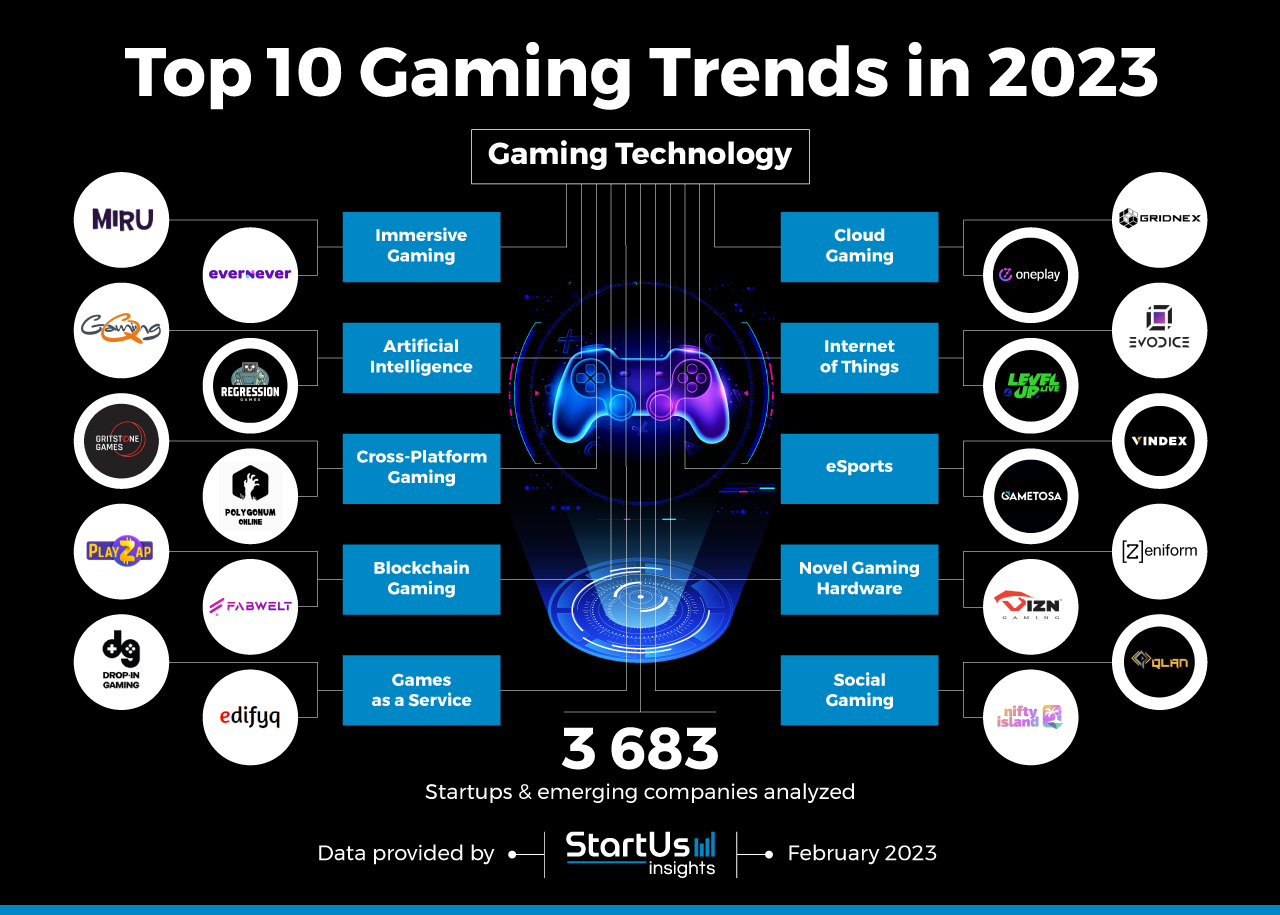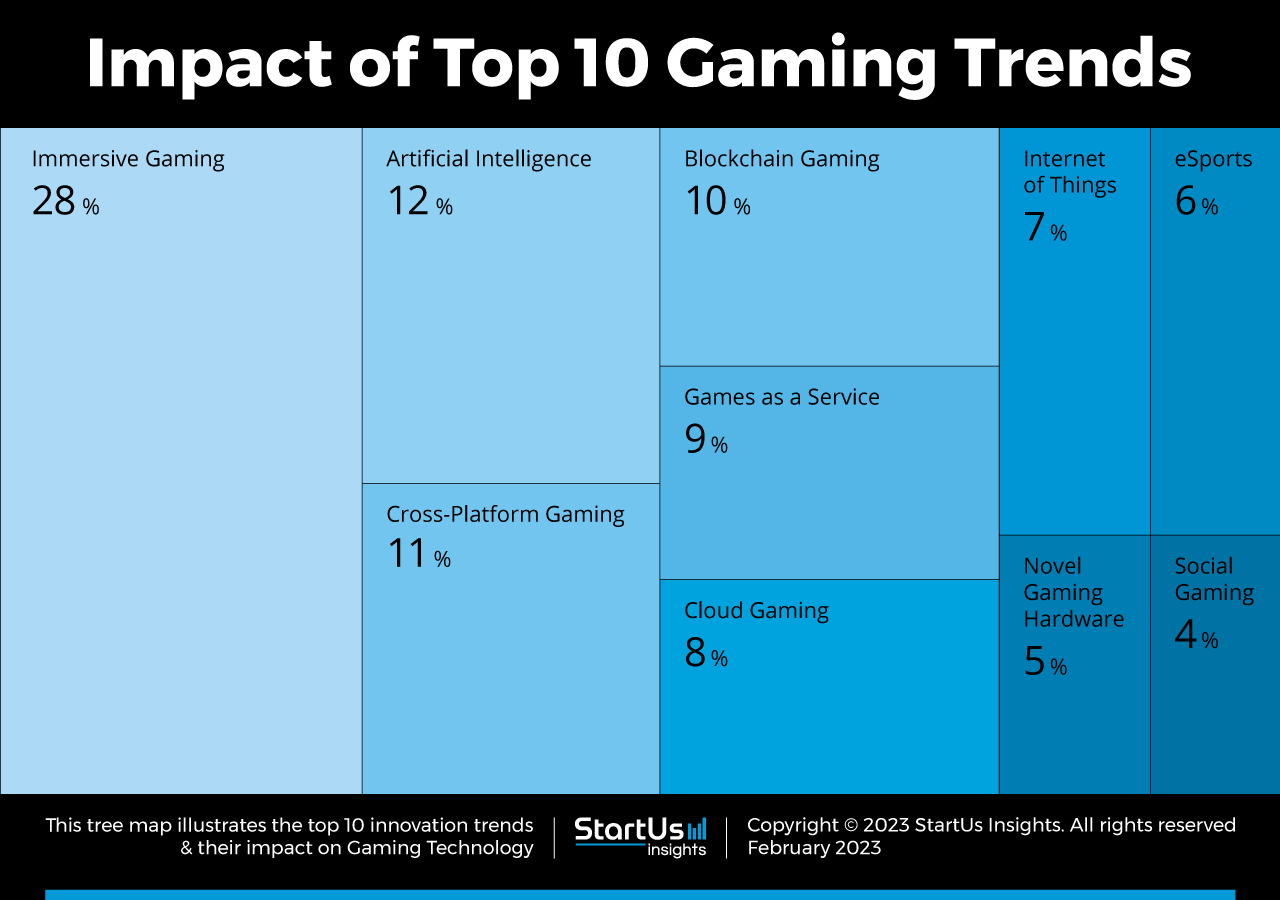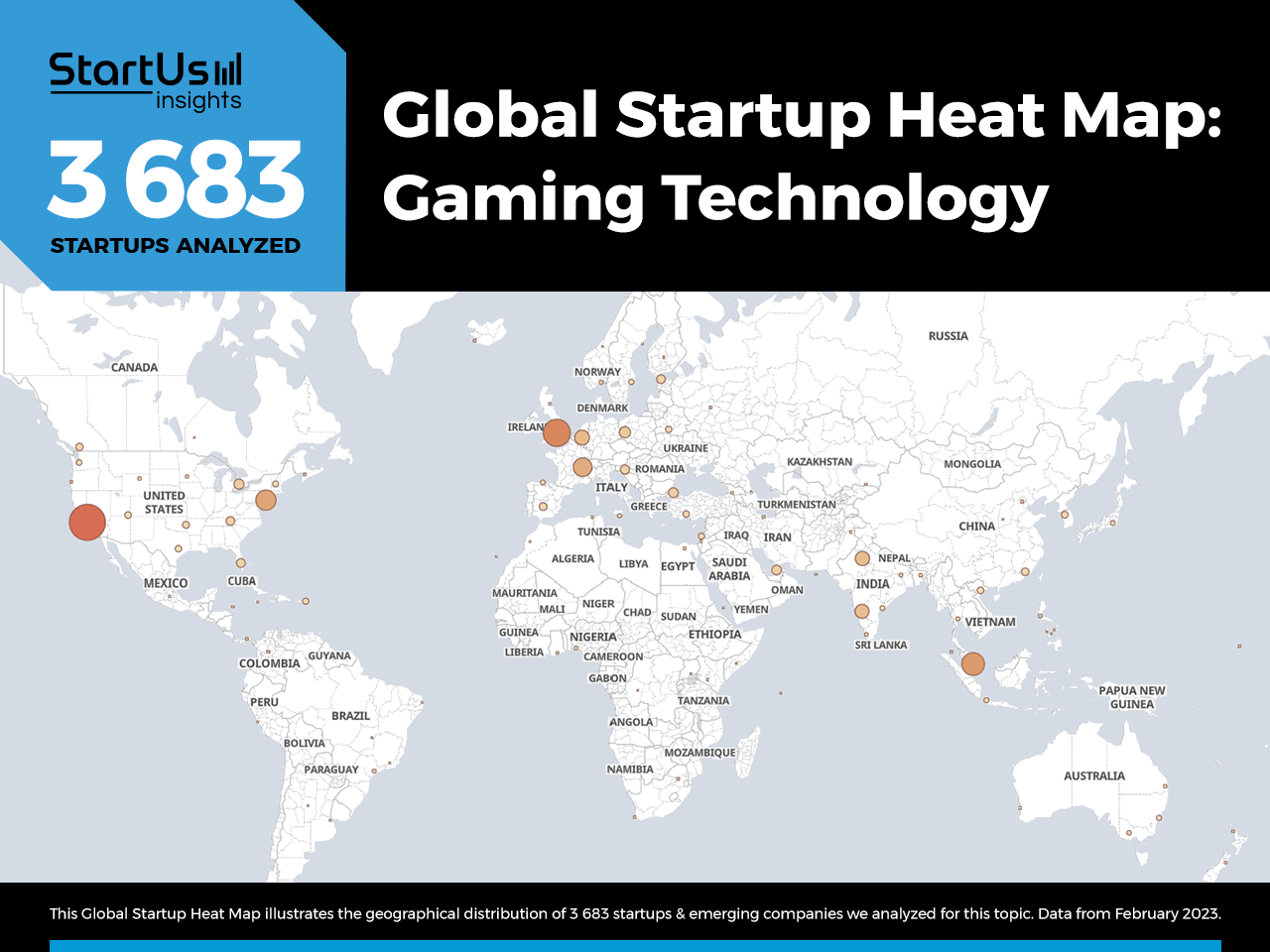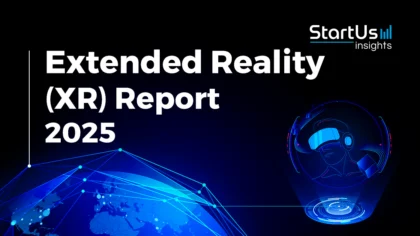Accelerate Productivity in 2025
Reignite Growth Despite the Global Slowdown
The gaming industry is undergoing significant transformations with various cutting-edge technologies, changing the way gamers play and experience games. Virtual reality (VR) and augmented reality (AR) offer immersive gaming experiences and allow players to interact with in-game environments more effectively. Cloud gaming also enables players to play games through remote servers, eliminating the need for expensive hardware. This research provides an overview of the top 10 global gaming trends, including artificial intelligence (AI), blockchain, and games as a service (GaaS). Read more to discover the latest developments in the gaming sector and discover how they impact your business.
Innovation Map outlines the Top 10 Gaming Trends & 20 Promising Startups
For this in-depth research on the Top Gaming Trends & Startups, we analyzed a sample of 3 683 global startups & scaleups. The result of this research is data-driven innovation intelligence that improves strategic decision-making by giving you an overview of emerging technologies & startups in the gaming industry. These insights are derived by working with our Big Data & Artificial Intelligence-powered StartUs Insights Discovery Platform, covering 3 790 000+ startups & scaleups globally. As the world’s largest resource for data on emerging companies, the SaaS platform enables you to identify relevant startups, emerging technologies & future industry trends quickly & exhaustively.
In the Innovation Map below, you get an overview of the Top 10 Gaming Trends & Innovations that impact 3 683 companies worldwide. Moreover, the Gaming Innovation Map reveals 20 hand-picked startups, all working on emerging technologies that advance their field.
Top 10 Gaming Trends in 2023
- Immersive Gaming
- Artificial Intelligence
- Cross-Platform Gaming
- Blockchain Gaming
- Games as a Service
- Cloud Gaming
- Internet of Things
- eSports
- Novel Gaming Hardware
- Social Gaming
Tree Map reveals the Impact of the Top 10 Gaming Trends
Based on the Gaming Innovation Map, the Tree Map below illustrates the impact of the Top 10 Gaming Trends in 2023. Startups and scaleups are enhancing gaming experiences by leveraging AR, VR, and metaverse. Integrating the internet of things (IoT) into VR headsets and gaming accessories enables connected gaming. Additionally, cross-platform and cloud gaming solutions advance hardware-agnostic gaming while AI ensures fair gameplay. Social games and eSports provide a platform for both developers and players to create healthy gaming communities while improving brand reach.
Global Startup Heat Map covers 3 683 Gaming Startups & Scaleups
The Global Startup Heat Map below highlights the global distribution of the 3 683 exemplary startups & scaleups that we analyzed for this research. Created through the StartUs Insights Discovery Platform, the Heat Map reveals that the US sees the most startup activity, followed by the UK and Singapore.
Below, you get to meet 20 out of these 3 683 promising startups & scaleups as well as the solutions they develop. These gaming startups are hand-picked based on criteria such as founding year, location, funding raised, & more. Depending on your specific needs, your top picks might look entirely different.
Top 10 Gaming Trends in 2023
1. Immersive Gaming
Immersive gaming uses technologies such as VR, AR, and mixed reality (MR) to deliver enhanced engagement and interactivity to gamers. These tools allow developers to create enhanced and immersive gaming experiences. Moreover, growing customer interest in the metaverse accelerates developments in gaming tailored for virtual worlds. 3D effects and real-time experiences also allow developers to create gaming environments that allow players to navigate games as virtual avatars. With AR, developers further leverage real-time digital interaction to enhance their products, Pokemon GO being the most successful example.
MIRU STUDIO develops VR Games
MIRU STUDIO is a Spanish startup that offers VR, AR, and XR games. The startup’s VR game, Finger Gun, allows players to use hands in the shape of a gun to shoot, grapple, and navigate. For this, the game utilizes sensors attached to players’ hands and a VR device, setting them in a 3D virtual environment. This delivers an immersive experience for gamers and improves engagement.
Evernever Games delivers Immersive Social Experiences
Evernever Games is a US-based startup that creates more social and immersive experiences by leveraging AR, VR, MR, and metaverse gaming. The startup’s solution, Neverboard Core+, allows game developers to integrate multiplayer solutions, immersive interfaces, and analytics in social gaming. Its other platform, Pulp Core+, enables them to create immersive narratives. This allows players to choose different storylines through speech interfaces and play as human non-player characters. Thus, the startup allows game businesses to develop more complex and personalized multiplayer games.
2. Artificial Intelligence
Game developers are leveraging AI to accelerate game design efforts and create more realistic and challenging opponents for gamers. Machine learning-powered non-player characters (NPCs) make in-game decisions based on player actions in real time. AI also analyzes player behavior and skills to improve game balance, ensuring fair and challenging gaming experiences. This allows game developers to generate game content such as terrain, levels, and puzzles, on the fly. Consequently, AI enables more dynamic and varied gameplay experiences while minimizing manual content creation. Lastly, AI-based solutions enhance game testing and the gaming industry is integrating AI to monitor in-game chats to ensure safe gaming environments.
Quantum Gaming makes Self-Learning AI Games
Quantum Gaming is a German startup that develops self-learning AI games. The startup’s cognitive architecture, brAIn Engine, models how the human brain works and creates cognitively plausible AI for game characters. As a result, these NPCs are empathic, feature realistic motor control, and interact with objects and other characters. The characters also learn from scratch from gamer input, allowing developers to deliver more personalized NPCs to improve gaming experiences.
Regression Games advances AI-based In-Game Character Modeling
Regression Games is a US-based startup that provides a platform for game developers to create game AIs, code characters, and train models. It leverages machine learning, frontend design, and game development infrastructure to offer automated testing and meta-balancing. It also allows studios to use bots across various servers and create bots in real time. This leads to quicker iterations and turnaround times.
3. Cross-Platform Gaming
The rise of smartphone and tablet gaming over PC gaming systems pushes game makers to deliver games across platforms. Cross-platform gaming thus allows gamers to access games without requiring any hardware. Moreover, cloud-based gaming plays a critical role in making cross-platform gaming more accessible. Further, this provides game studios an opportunity to reach more players and expand their customer base.
Polygonum Online offers Free-To-Play Cross-Platform Games
Polygonum Online is a Kazakhstan-based startup that develops cross-platform gaming. It creates a free-to-play, cross-platform multiplayer game with non-fungible tokens (NFTs) and an NPC marketplace. For this, the startup uses Unity’s Unreal Engine, Binance Smart Chain (BSC), and Nodejs JavaScript engine. FARM Zone, PVE Zone, and PVP Zone are the startup’s open-world zones for players. This combination of a free-to-play model and decentralized digital asset exchange increases customer retention.
Gritstone Games develops a Cross-Platform Chess Game
Gritstone Games is a UK-based game development startup that focuses on cross-platform gaming. It makes games for desktops, consoles, smartphones, handhelds, and VR. Tafl is the startup’s chess game where players earn runes to customize the characters and challenge players across all platforms. The game is synced across multiple platforms, allowing gamers to play the game across devices.
4. Blockchain Gaming
Gaming startups integrate blockchain into the gaming ecosystem to enable more monetization opportunities. For instance, studios create their own cryptocurrencies or tokens to monetize in-game assets and accessories. This enables players to own skins, weapons, and characters by minting unique NFTs. Additionally, blockchain gaming creates new opportunities for trading, collecting, and creating value around in-game assets. Blockchain further enables decentralized anti-cheat mechanisms that allow developers to improve data security and ensure a fair gaming ecosystem.
PlayZap Games makes a Blockchain-powered Competitive Gaming Platform
PlayZap Games is a Singaporean startup that offers a competitive gaming platform. It leverages blockchain and a sustainable token economy to deliver the startup’s NFTs. Its free-to-play community-driven gaming arena allows players to win prizes, earn tokens, and own digital assets. PlayZap Games also integrates a web3 infrastructure to ensure a transparent ecosystem ownership and reward system.
Fabwelt builds a Blockchain Gaming Ecosystem
Fabwelt is a German startup that creates a gaming ecosystem with in-game NFTs, a play-to-earn gaming model, and decentralized finance (DeFi). The startup’s platform provides cross-chain gaming and tournaments for its games like Arsenal and H2O. It enables players to earn rewards for playing these games. Also, the startup’s fantasy gaming platform covers multiple sports for a more dynamic experience. The startup, in turn, provides a digital immersive ecosystem with enhanced gaming, integrated with digital cross-game identity and multi-tiered tournaments.
5. Games as a Service
Game studios are now delivering games as a continuous service through the internet, rather than as a one-time purchase. This business model allows game developers to provide ongoing content and updates to their players, increasing playtime. Moreover, GaaS provides a steady revenue for game developers. Many studios also integrate free-to-play and subscription models, where players make in-game purchases to progress more quickly and increase player acquisition
Drop-In Gaming creates a Gaming as a Service Platform
Drop-In Gaming is a US-based startup that makes a games as a service platform. It allows players to win cash prizes through bracket play, matches, and tournaments. The startup offers free and paid tournaments for players with partnered tournaments. The startup also makes a marketplace for gaming merchandise where gamers shop for gaming accessories. This allows developers and businesses to reach more audiences through gaming.
edifyq makes a Game Tournament System
edifyq is a UK-based startup that provides a games as a service platform. Its tournament system allows players to join or create their own tournaments. Additionally, the startup offers a proprietary cryptocurrency for in-game transactions while the tournaments are managed by smart contracts. These tournaments are validated and secured by the mining process where the gaming community participates to earn profits. This allows the startup to offer a decentralized gaming platform for game businesses and studios, helping them increase their reach and player retention.

6. Cloud Gaming
Rendering games on remote servers allows gamers to play games through the internet and across devices. This eliminates the need for expensive and high-performance hardware for gamers. Moreover, cloud gaming enables them to access AAA games on low-end laptops and PCs, opening up games to a broader audience. It is also fueled by the increasing popularity of mobile gaming and the 5G, which provides high-speed and low-latency connectivity for cloud gaming.
Gridnex makes a Cloud Gaming Platform
Gridnex is a Tunisian startup that develops a cloud gaming platform. It allows gamers to play games on any device and mitigate expenses on high-end devices and installations. The startup also provides another platform, GameCloud Platform, for developers to submit games. This allows developers to quickly deliver games to a wider audience pool and increase revenue.
OnePlay enables Decentralized Cloud Gaming
OnePlay is an Indian startup that offers decentralized cloud gaming. It leverages decentralized cloud streaming to deliver a cross-platform and hardware-agnostic gaming architecture. The startup also offers a platform where players rent their hardware and servers to earn proprietary coins. Its open-source operating system and streaming technology thus allow game developers to host games and connect to the network. OnePlay also facilitates game development, VR apps, and decentralized apps (dApps) and running them over the decentralized network.
7. Internet of Things
The integration of IoT in gaming systems allows developers to connect games with physical devices. IoT-enabled smart controllers and devices provide immersive experiences to gamers. To accelerate this, many startups offer gaming wearables, like smartwatches and gesture control devices, to monitor gamer heart rate, movement, and other physiological responses. Developers use this data to create games that respond to their physical state, creating more connected experiences. Smart home devices like lights, air conditioning, and music systems also allow developers to design more complex games that create a dynamic gaming experience.
Evodice advances IoT-enabled Gaming
Evodice is a Turkish startup that offers IoT-enabled gaming. The startup’s customizable interactive cube is easily programmable through a mobile application and has a touchscreen on each surface. It also features an accelerometer and a gyroscope to identify player gestures for various educational games. With its separately programmable screens, sensors, and sound systems, the cube provides players with a more atmospheric experience.
Level Up Live offers a Smart Target System
Level Up Live is a US-based startup that builds a smart target system to gamify shooting ranges. It includes an IoT-enabled gun and an LED-driven instant feedback system that delivers an immersive shooting experience. The smart target system also leverages AI to analyze shooter parameters like speed and accuracy. This data allows customers to improve their performance.
8. eSports
eSports provides game developers and producers with an efficient way to engage with players and build a community around their games. By observing how players interact with their games and other gamers in a competitive environment, developers identify areas for improvement for games. Sponsoring and hosting e-sports events and competitions also enable developers to increase brand awareness and attract new players. Therefore, developers add eSports-focused features to their games, such as built-in match-making systems, spectator modes, and leaderboard systems. These features enhance the competitive nature of their games and attract more players.
Vindex provides an eSports Gaming Platform
Vindex is a US-based startup that develops an eSports gaming platform for audience management. Its engagement solution, Esports Engine, allows game publishers and brands to simplify production, tournament, and program management for eSports events. The startup’s subscription-based platform, Belong, provides arenas, tournaments, and a marketplace for gamers on demand. Further, Vindex develops an eSports intelligence platform, Vindex Intelligence, to track leagues, teams, and players. It delivers actionable insights into customer engagement, media consumption, and player activity trends. These solutions allow game businesses to improve audience discovery and better evaluate player performances.
Gametosa aids eSports Hosting
Gametosa is an Indian startup that offers an eSports hosting and gaming platform. It is an HTML5 cross-gaming platform that allows gamers to play without downloading the games. The platform thus brings gamers together to improve their skills and compete against each other. Additionally, it allows gamers to earn rewards by completing tasks. For creators, the platform provides an easy way to receive donations, provide memberships, and integrate brand campaigns.
9. Novel Gaming Hardware
Players are increasingly looking for next-generation gaming experiences with better graphics, faster load times, and smoother gameplay. High-performance gaming hardware enables more responsive and accurate physics engines and AI systems. This allows developers to deliver more realistic and immersive experiences. Other improvements in gaming hardware include novel CPUs, advanced processing units (APUs), improved memory drives, and high-performance graphics processing units (GPUs). Integration of AR, VR, and IoT further allows game developers to deliver a connected and social gaming experience. Other technologies, like facial recognition and gesture control, provide more convenient interfaces to navigate games.
Zeniform advances Wearable Fitness Gaming
Zeniform is a US-based startup that converts player workouts into adventure games. The startup’s role-playing game (RPG), Zeniverse, connects exercises to in-game characters. For this, Zeniform provides a wearable controller that senses wearers’ movements to navigate inside the game. It consists of two 3D tracking sensors which also allow real-time AI voice and 3D visual feedback. The startup builds Zeniform 3D Form Engine and Duo Nodes that utilize smart 3D motion tracking and voice cues to generate real-time 3D human models. This hardware solution enables game developers to create more interactive games and easily collect player data.
VIZN Gaming simplifies Games to VR Conversion
VIZN Gaming is a US-based startup that converts conventional games into VR games. The startup’s device, UltraVR, enables gamers to play conventional video games in 360-degree 3D VR. It uses a super converter for converting game-engine-based content into 360 3D VR in real time without changing the content. This allows gamers to play retro games and older titles in VR, allowing developers to rekindle popular games.
10. Social Gaming
Social gaming offers increased player engagement by allowing players to connect and interact with other players. This fosters a sense of togetherness among players and improves loyalty. This creates new monetization opportunities for developers, such as in-game purchases, subscriptions, and advertising. Social gaming also provides developers with valuable user data like player demographics and behavior patterns. This helps developers to better understand their players and create more targeted and effective marketing campaigns.
Qlan maintains a Social Gaming Network
Qlan is an Indian startup that develops an AI-based networking app that connects gamers and eSports enthusiasts. It allows users to create custom profiles, sync their in-game statistics, and access AI-based matchmaking. Gamers are also able to feature their gaming content and short video highlights to build a fanbase. For game studios, the app brings in more customers and increases brand awareness.
Nifty Island creates an Open Social Gaming Platform
Nifty Island is a US-based startup that makes a web3-based open social gaming platform. The startup’s gameverse offers a marketplace and a play-to-earn ecosystem where players socialize with other players through voice and text. It also allows users to display NFT collections on their personal islands and acquire new metaverse-ready NFTs. Web3 communities and other web3 gaming projects have an island to chat, build, and play together. This allows game developers and gamers to better connect with each other and improve networking.
Discover all Gaming Trends, Technologies & Startups
Artificial intelligence, IoT, and blockchain in gaming improve player experience and provide them more control over in-game digital assets. Immersive technologies, like AR, VR, and XR, are creating enhanced virtual environments for gamers. Additionally, concerns around data theft drive investments toward cybersecurity solutions in the gaming industry.
The Gaming Trends & Startups outlined in this report only scratch the surface of trends that we identified during our data-driven innovation & startup scouting process. Among others, high-performance computing (HPC), blockchain, and the metaverse will transform the sector as we know it today. Identifying new opportunities & emerging technologies to implement into your business goes a long way in gaining a competitive advantage. Get in touch to easily & exhaustively scout startups, technologies & trends that matter to you!
